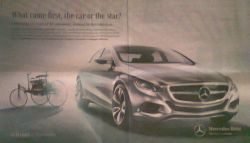 It’s widely known that Ford Motors developed the assembly line to mass produce automobiles so that they became affordable for everyone including their own shopfloor workers.
It’s widely known that Ford Motors developed the assembly line to mass produce automobiles so that they became affordable for everyone including their own shopfloor workers.
Thanks to the powerful legend of Henry Ford and Model T, it’s also popularly believed that Ford invented the automobile.
But, this is not true.
The car was actually invented by Mercedes Benz in 1886 as the company’s recent ads point out. Commemorating the 125th anniversary of the invention, the luxury car maker – which is a division Daimler AG, the company named after Herr Daimler, the person who actually invented the automobile – lists its other pioneering innovations such as airbags, ESP, ABS, and so on.
I learned about the German origin of the car from another ad, which, by the way, happens to be one of the best ads I’ve ever seen.
 This was a huge sign placed over the giant clock on the main concourse of the Frankfurt Hauptbahnhof (Central Railway Station) during the International Automobile Exhibition. IAA, as the exhibition is known in the German language, is the world’s largest automobile fair that is held once in two years in Frankfurt. The first three lines of the ad translate to:
This was a huge sign placed over the giant clock on the main concourse of the Frankfurt Hauptbahnhof (Central Railway Station) during the International Automobile Exhibition. IAA, as the exhibition is known in the German language, is the world’s largest automobile fair that is held once in two years in Frankfurt. The first three lines of the ad translate to:
The Italians invented the horn,
The Hessen the IAA.
And we, the car.
Apart from the truth, the first line echoes the popular German opinion that Italy is a noisy and chaotic place – at least by European standards. Since most people seeing the sign were visitors to the famous IAA fair then taking place in Frankfurt, a city located in the German state of Hessen, the second line is self-explanatory. It was the third line that enlightened me about the fact that the car was invented in Germany, more specifically in the state of Baden-Württemberg, whose government was the sponsor of this ad. Incidentally, Daimler AG’s headquarters is located in Stuttgart, which is the capital of this state.
Having informed everyone that it invented the car, Baden-Württemberg felt emboldened to proclaim that it could do anything – that’s what the first sentence after its name means.
After such a heavy display of braggadacio, the state government probably found it necessary to show a touch of humility. So, it signs off the ad by excluding ‘High German’ from its claim of omnipotence. This is a reflection of the legendary difficulty faced by citizens of Baden-Württemberg in speaking ‘High German’, which is the standardized version of the German language used for formal communications amongst Germans hailing from different states of the nation having their own dialects.